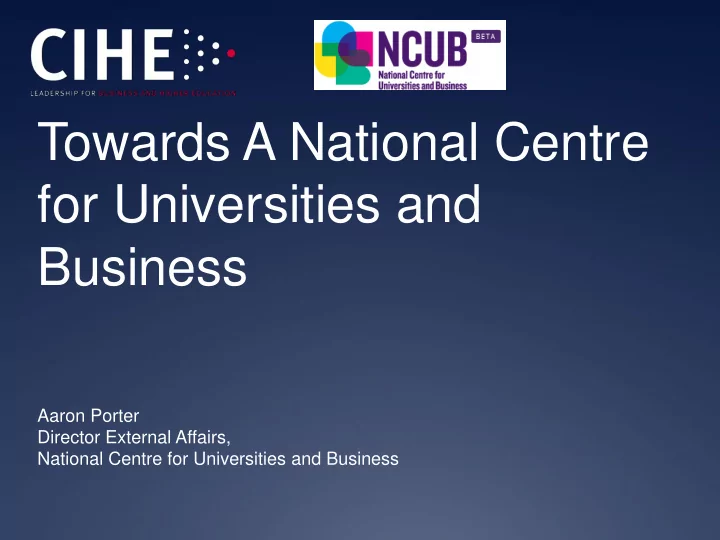

Towards A National Centre for Universities and Business Aaron Porter Director External Affairs, National Centre for Universities and Business
CIHE Mission The CIHE is a strategic network of senior business leaders of blue-chip businesses collaborating with Vice Chancellors and universities to develop the UK’s knowledge -based economy. It does this by: • Working on the UK’s grand challenges through thought -leadership in policy and practice. • Lobbying on behalf of the business -university partnerships at the highest levels of government. • Co -operating to produce graduates with the right expertise, strengths and talent for a modern business environment. • Promoting best practice collaborative research between companies and universities to increase the competitive strength of businesses in the UK.
CIHE Task Forces
Wilson Review of Business-University Collaboration The Council for Industry and Higher Education (CIHE) should be invited to develop its structure and its infrastructure to become an independent subscription‐based charity that becomes the focus for information on business – university collaboration. It will gather and maintain a comprehensive repository of good practice, undertake commissioned studies and provide a reliable information source for future substantive reviews . David Willetts ’ and BIS Response to Wilson: BIS will support the Council for Industry and Higher Education (CIHE) to create a National Centre for Universities and Business. The centre will focus on strengthening the strategic partnership between universities and business with a view to driving economic growth and recovery .
CIHE and NCUB From March, the CIHE will operate as NCUB. CIHE Trustees have signed off subject to funding from other strategic partners All CIHE activities – Task Forces, Talent 2030, The Fuse, Annual Lecture, private lunches, breakfasts, ministerial summit will be branded NCUB CIHE CEO to become CEO of NCUB CIHE Trustees to become initial Trustee board for NCUB. CIHE Council to become the initial UK Leadership Council for NCUB.
NCUB Vision & Mission Vision Increasing the prosperity and wellbeing of the UK through world-leading university and business collaboration. Mission By effective collaboration nurture the right talent, innovation and expertise for the UK’s future growth.
Areas of Focus The three areas of focus for the National Centre for Universities and Business will be: Brokering and facilitating world class collaboration Working together to build the high-level talent base for the UK’s future growth and well-being. Translating inventiveness into innovation
Summary of Operations Inventiveness into Areas of Talent, Expertise and innovation and growth Attributes operation Analysis Brokerage Inspiration Action Types of (measure (best practice & (IP & (Practical operation performance) case studies) internships) projects) Government & Target SMEs Universities Corporates Devolved Audience administrations and Partners International & Inward Investment
Priority Areas for Year 1 Skills & Employability- What talent does business really need? – particularly in specific areas such as design and software engineering? What do we mean by employability? Is it the right word? How do we create a mutual understanding of it between business and the HE system? What does a quality placement look like and can we create a national scheme working with others? Brokerage & networking - Range of things from high level ministerial meetings to broader working groups around key programmes for change. Exploring social networking solutions for working with TSB HEFCE and RCUK - potential pilot projects around university-business-Catalyst networks. Web site/mobile services State of the Relationship report - Collective view of business and universities Sector specific ‘Myth -busting'
Current activity NCUB business BIS funded projects planning & start-up 1. Business plan 1. Rich media case 2. Funding studies 3. Stakeholder 2. On-line stakeholder engagement survey 4. Governance + legal 3. STEM Survey 5. Branding 4. Employability skills 6. Web site + content fact finding 7. Recruitment
‘Great Expectations’ Report from the Council for Industry & Higher Education (CIHE) published in October 2011. Set out different scenarios to consider the future competitiveness of the UK in engineering and manufacturing . Future increased participation of women seen as vital going forward.
Four different types of women emerged Type 1: ‘Over my dead body’ Nothing would attract them to manufacturing or engineering (21%); Type 2: ‘Fresh starters’ These women could be persuaded to take up a career in manufacturing and engineering, but were not doing the right degrees (41%); Type 3: ‘Switchers’ were persuadable and had the right degrees (26%); Type 4: ‘Enthusiasts’ who want a career in engineering and manufacturing (12%)
Making engineering more appealing to women High salaries (of awareness of what you can earn) Green jobs (sustainability, renewable energy etc.) Challenging the male dominance of jobs
What do the stats say… Currently only 20.8% of A Levels in Physics are taken by women (the figure is 40% in mathematics & 42% Design Technology) – JCQ 2011 Currently on 16.3% of Undergraduate engineering degrees are taken by women (the figure is 58% in medicine & 43% in physical sciences) – HESA 2010/11
and more stats 19.6% of UKs PhDs in engineering and manufacturing taken by women (European average is 21.9%. Women take 42% in social sciences, 42% in science & computing and 52% in health & welfare) 8.7% of UK professional engineers are women (lowest in Europe). In Bulgaria it is 30%, Sweden in 28%. European average is 21.3% - EngineeringUK 2010
Talent 2030 • With an explicit focus on raising aspiration and increasing the participation of girls and young women in engineering and manufacturing. • Working with other outreach programmes , but also with university academic departments and outreach departments . • CERN visit with Warwick University taking Year 9 pupils from 10 schools in Coventry & Warwickshire.
National schools ENGINEERING competition for girls Simple question - How can engineering solve the challenges of the 21 st century? Entries – www.talent2030.org/girlsengineering Rules – Age categories (11-14) and (15-18) Entries from individuals or groups of up to 6 Deadline – Friday 10 May 2013
Recommend
More recommend